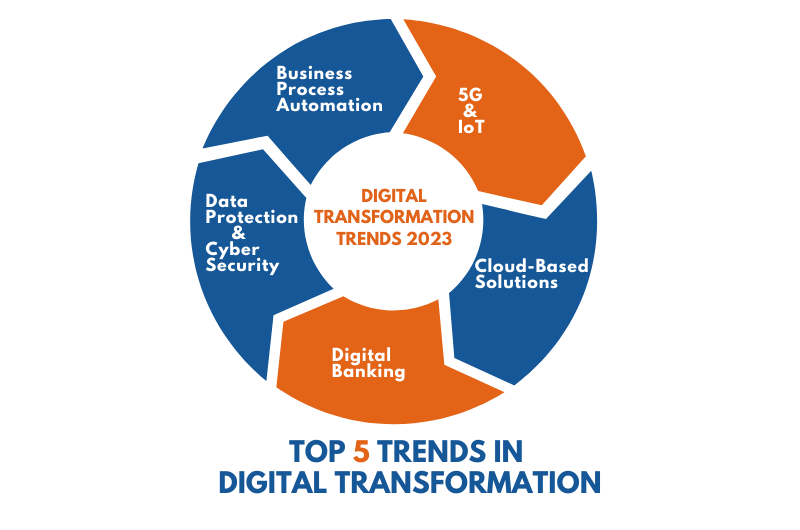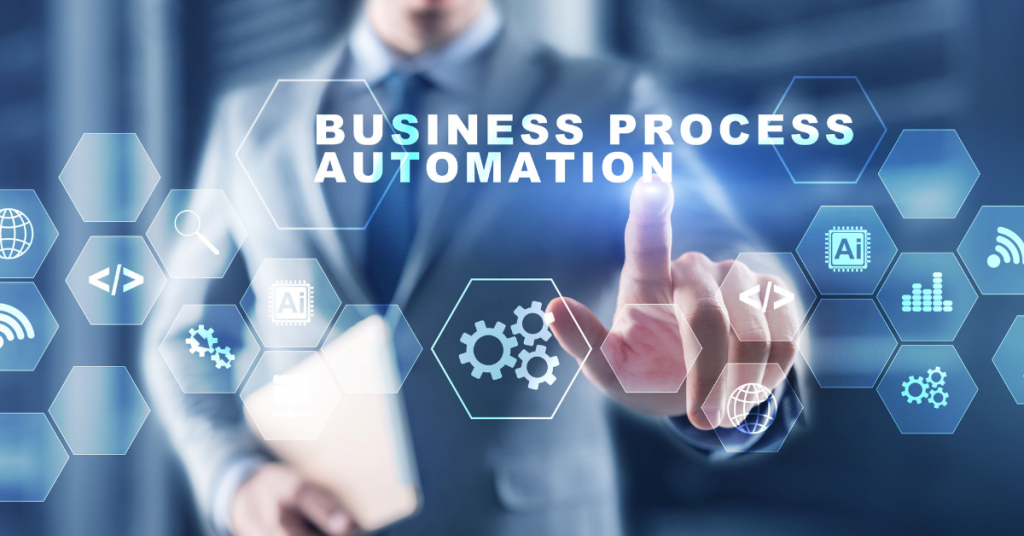UK Office
20-22 Wenlock Road, London, N1 7GU
+44 7360 260701

Various technological advancements have allowed remote work to be performed in the wake of the Covid-19 epidemic. What would have occurred if technology hadn’t come to the rescue? The world as we know it would have stopped functioning.
Digital Technology also enables companies to reduce costs while increasing efficiency. That is precisely why we are eager to see what the year 2023 has in store. This article discusses the top 5 digital transformation trends in the new year that will have the most impact on organizations.
We anticipate the following top trends in 2023:
To remain relevant, businesses must build and enhance capabilities utilizing these top trends going into the new year.
Organisations must adopt digital transformation via Business Process Automation (BPA) as automation tools become more usable and affordable. More specifically, automation for small businesses is a must for companies who want to survive and expand into new markets with a competitive edge. To see the full benefits of BPA, it must be implemented end-to-end, covering operations, marketing, and shared services such as accounting, HR, IT, and legal.
Next year, with more affordable options continually introduced, automation will no longer be reserved for large corporations. Over 77% of firms utilize automation, application development, and AI tools regularly in their everyday operations, according to Gartner. Automating repetitive, risky, and dangerous work is just some of the possibilities with the introduction of artificial intelligence.

They both represent the progression of mobile communications. There will be lightning-fast response times thanks to the 5G network; supposedly, data exchanges that took hundreds of milliseconds will now take only a few milliseconds. Every online company that relies on IoT will greatly benefit from the widespread adoption of 5G. With 5G, businesses will benefit from increased connectivity, quicker broadband speeds, and more reliable mobile networks. The technology will improve upon previous methods in terms of dependability, security, deployment, and data transfer rates.
Significant increases in operational efficiency can be achieved by a company’s decision to invest in the 5G network and increase the usage of IoT in business. 5G has increased data transfer rates and created a broader range of deployment, stronger dependability, and tighter security. Users will benefit from increased connectivity and higher broadband speeds because of 5G’s availability on mobile networks.
You should expect these and other major themes to influence your plans for digital transformation throughout the coming year and beyond.

Cloud computing eliminates the need for costly and time-consuming on-premises hardware and maintenance by giving businesses and their clients remote, web-based access to their data and applications. The technology has enabled firms more flexibility, scalability, agility, enhanced collaboration abilities, and new development prospects, and has contributed to their accelerated digital transformation.
Better data security is essential for businesses and corporations that use digital technologies. Because hacker dangers have increased in proportion to technological advancements, more data security measures are imperative. By utilizing the cloud, businesses can benefit from increased cyber security measures that safeguard sensitive company information. Beginning in 2023, technological progress will necessitate the use of cloud-based data security solutions by all enterprises.

Artificial intelligence, machine learning, the Internet of Things, robotic process automation, and blockchain are among the cutting-edge technologies that will drastically alter the banking industry. Nowadays, most financial services are accessible online. When loans were first introduced, the approval process used to take weeks. Today, however, it takes only a few seconds to find out the status of your loan application.
By 2024, there will be 2.5 billion users of online banking services worldwide.
It’s possible that you’ve observed a rise in the number of online lenders and credit card issuers. Documents and other evidence are now evaluated digitally. This is the way financial services of the future will function. In this digital age, you may apply for a loan, pay your bills, and do just about anything else with a few clicks of your mouse.

In 2023, Digital Transformation will be led by Data Protection Regulation. Due to the Civid-19 epidemic, internet transactions have surged, making cybersecurity more crucial. The demand for enhanced security has increased as more businesses have shifted to a virtual working environment. One of the primary foci of technological development and commercial exchanges in 2023 will be safety. Organizations will have to implement security-by-default policies protecting their customers’ data which is essential to succeeding in today’s market. In the new year, you can count on seeing a premium placed on openness and security.

Do you need a trustworthy partner who can work with you to take advantage of these trends now? Get ahead of the competition by having a word with our IT Consultants now or ask for a free consultation. Give us a call at +44 7444 554814 or email us at [email protected]
It’s safe to conclude that digital transformation through leveraging the latest trends is the only go-to strategy for companies who want to survive and flourish in a competitive and disruptive environment. Bringing digitalization does not only about bringing new technologies but it’s also about the shift in corporate culture and most importantly upskilling and developing people. DigyCorp has been influential in bringing Digitalization to our clients by providing valuable advice and supplying competitively priced resources.
At DigyCorp, we believe in transparency, integrity, and honesty. We aspire to embed these values as part of our core ethics in every aspect of our business. We passionately believe in supporting our clients through their journey of digital transformation into the new digital era.